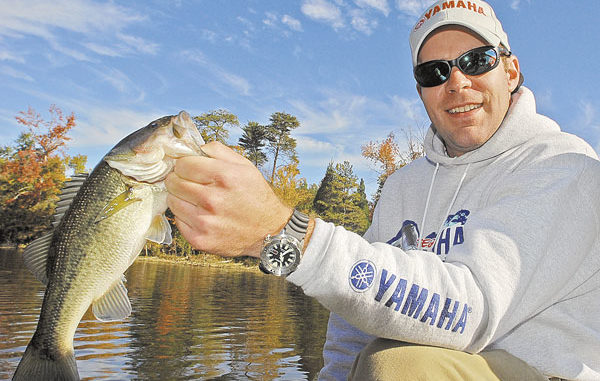
Find the fish and lose the crowds on three small Triangle area lakes.
It happens every day around the Triangle. Boats are hitched, tackle is loaded and anglers head to one of the Big Three: Jordan Lake, Falls of the Neuse Lake or Shearon Harris Lake.
But on the way to those famous reservoirs, fishermen drive right past uncrowded water every bit as fertile as the big lakes. The road less-traveled can yield big dividends for intrepid anglers looking for a change of scenery. Three perfect examples are Chapel Hill’s University Lake, Raleigh’s Lake Wheeler and Durham’s Lake Michie, smaller, municipal lakes that are full of fish.
Carey Foster graduated from UNC-Chapel Hill in 2009 and moved back to his native Kill Devil Hills. He’s got saltwater in his blood, but during his years at UNC he spent as much time at University Lake as he did on Franklin Street, and even now, he regularly makes the 4-hour trek just to fish for bass. But it did take a while for the lake to grow on him.
“I fished it a few times and wasn’t impressed,” he said. “I needed a way to connect. I tried some other places but kept coming back to U-Lake.”
University Lake is different from your typical bass lake. For one, leave your bass boat at home because gas motors are not allowed, nor are trailered boats. You can bring a car-topper or rent a jonboat. That’s part of the ambience; no noise. Bald eagles, albino deer and river otters are some of the fauna you might see.
By late May, most of the lake’s bass have spawned, but some bed right through the summer. Foster likes to target the many blowdowns on the east bank heading out of the dock, right on up to the bridge and under it. The old reliable Pop-R is a common topwater option early in the morning.
“The slower you fish it, the better,” Foster said. “It’s a good way to catch a big fish on that lake.”
A chartreuse spinnerbait with willow leaf-blades is another favorite offering, and medium-diving crankbaits can effective as well.
“Typically, I work from three to five feet out to six to 12 feet,” Foster said. “I really don’t fish deeper than that.”
A real go-to bait on University Lake is a plastic worm rigged Texas-style or on a Shakey head jig. Don’t hesitate to use a 4-inch finesse worm if bass are finicky.
“I like the Shakey head more,” Foster said. “It’s more in contact with the bottom. It’s my history, I think. Ninety percent of my inshore fishing is jig fishing. For Shakey head fishing I usually use a 1/8th- to 3/8th-ounce jighead.”
Bob Glosson, senior assistant warden at University Lake, has worked there for 27 years. An avid angler, he echoed much of what Foster said.
“University Lake is very much a ‘chartreuse lake,’” he said. “In June, topwater works well, as do lightly-weighted worms in junebug, pumpkinseed and green. Rat-L-Traps in smokey joe and chrome work well, too.”
Glosson has seen bass over 11 pounds come out of the lake, as well as catfish up to 25 pounds and crappie at four pounds.
Foster’s best day was March 20, 2008 — he keeps a journal. “It’s what really turned me on to the lake,” said Foster, who along with a buddy caught a load of bass, the biggest five weighing more than 29 pounds and the
He and a buddy caught a mess, and the best five went over 29 pounds, including his personal best of nine pounds.
“I think it’s one of the best bass lakes in North Carolina,” he said.
North of Durham in the bucolic community of Bahama — pronounced with a long “a” in the middle — lies Lake Michie (pronounced like the mouse, mickey). It offers fabulous shallow targets, deep channels and rock formations — and almost no crowds.
Jason Rackley, 36, has been fishing Michie since 1993, when childhood friend Dustin Wilks — now a Bassmaster Elite pro — turned him on to the lake. Rackley graduated from N.C. State with a degree in fisheries and wildlife management, and parlayed that into a career with The Fidelity Bank. When he’s not closing deals, he’s out in his Triton, and Michie is a favorite destination.
“It’s a big-fish lake, a lot like Hyco but with more blowdowns,” Rackley said. “In June, you’ll be catching mostly postspawn fish. Look at the water color. If it’s stained in the morning I’ll start with a buzzbait targeting isolated cover. I’ll start on rocky points and try to get as tight to cover as I can.”
Rackley prefers a 3/8ths- to half-ounce Cavitron for this work. He’s also a big fan of shallow-running crankbaits in three to six feet of water.
“One good thing about the shallow crankbait is that it will call fish up if the water clarity is there,” he said.
Bomber and Bandit crankbaits are good choices, he said, as well as lipless crankbaits, especially on the flats. Rat-L-Traps in quarter- and half-ounce sizes are good choices, especially in orange, red craw and golden shiner colors.
With so much wood and rock to target, Rackley loves to flip a jig tight to blowdowns and other structure on primary and secondary points and down the sides of the points. During the heat of the summer Carolina-rigged plastics fished on rocky points are effective.
He did offer a wise caveat for Michie, especially after a heavy rain.
“Because it’s such a high-ridged lake, there’s always stuff floating off the bank or coming down the feeder creeks,” he said.
The lake is fed by the Flat River, so be aware of partially submerged logs when running, especially in the north end.
Rackley and fishing partner J.T. Atwell of Raleigh had a good day at Michie earlier this year. They started out on the deep, rocky banks across from the boathouse with no luck. They headed to coves with feeder creeks and deep water close by, and things heated up.
“J.T. had just caught a 2-pounder on a spinnerbait when something hit my Megabass Z-Crank,” said Rackley. “J.T. said, ‘You have got a hog.’”
Rackley’s crankbait rod doubled over and line peeled of his reel. After a few minutes, he lipped an 8-pounder, the second of 25 fish landed that morning, the best five going well over 20 pounds.
“I’d say (Michie) is in the top three in the state,” Rackley said. “The longer it’s open [during the season], the less pressure it gets. On a busy day, you might see 20 boats.”
Lake Wheeler is about five miles south of Raleigh, part of a city recreational facility. Fishing-wise, the lake can be tough to figure out at first, as the shoreline is devoid of many blowdowns and there is little bottom structure or points to target.
But Chris Wood, 24, of Raleigh has figured it out.
“It’s not necessarily consistent, but it can be easy to figure out because it’s so small,” he said. “It has a big fish reputation, and one of my buddies has the lake record at 11 pounds, four ounces.”
Wood, who fished with the N.C. State BassPack fishing club before graduating, likes to throw crankbaits for postspawn fish in June. He targets flats and channels close to spawning areas. As the summer progresses, he’ll move out to 10 to 16 feet of water, using jigs, Shaky head worms and Texas-rigged plastics in addition to crankbaits. Gizzard shad are the primary forage in the lake.
“I prefer jigs, half- to 5/8ths-ounce, in black-blue or blue-sapphire,” he said. “I use a plastic trailer and scent.”
Two of his favorite lures for summer cranking are Strike King’s 5XD and 6XD. He uses a JB Custom Rod 7-foot graphite rod paired with a Shimano Curado D with a 5:1 retrieve ratio. “The slower retrieve keeps the bait in the strike zone longer,” he said.
It doesn’t hurt to try topwater early in the day, particularly in coves and around wood and rock on the south side of the lake. The main channel runs mostly on the south side, so the fish have quick access to deep water. Don’t be surprised to catch huge crappie when bass fishing, as the lake gives up 3-pound slabs every year. There are big channel catfish in the lake as well. But the bass fishing can be stellar.
“My best day on Wheeler, I had four bass that went 27 pounds, nine ounces, including one that went 10 pounds, two ounces and one that went 9-7. My biggest bass I caught one March in four feet of water; it weighed 10 pounds, four ounces.”
That’s impressive anywhere, much less a city park.
Mike Zlotnicki is the former outdoors editor at The News & Observer of Raleigh. He has a journalism degree from UNC-CH, and has won numerous writing awards. He lives in Garner with his wife, three daughters and a retired German shorthaired pointer.

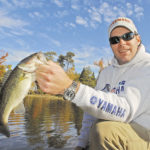
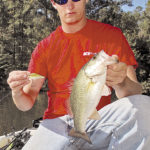
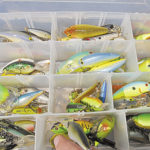
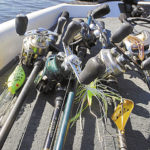
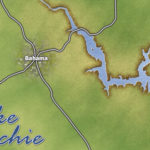
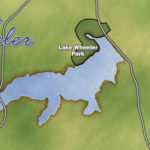
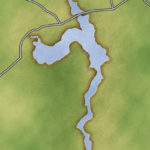
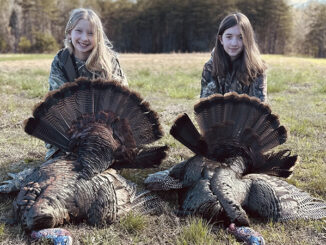
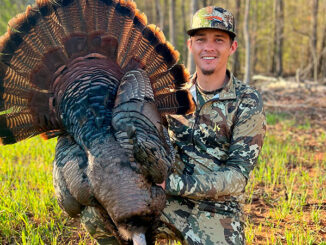
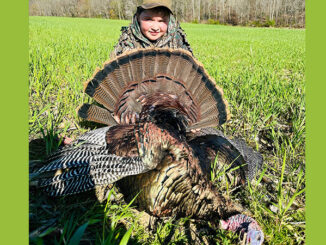
Be the first to comment